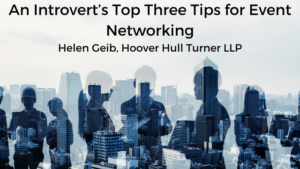
I have the introvert’s natural fear of crowds. Making small talk with strangers at conferences used to fill me with dread. The breakthrough came when I realized that networking is a skill and like other skills, it can be learned.
With practice I’ve gotten much better at striking up a conversation with people I’ve only met once or twice or (gasp!) am meeting for the first time. And while I’ll always be more comfortable in small group settings, I no longer fear happy hour receptions. Often I even enjoy them!
I hope these three tips will help you too to not just survive but thrive at professional events.
1. Accept negative emotions and turn them in a positive direction.
Start by giving yourself permission to feel negative emotions. It’s normal to be nervous, uncomfortable or even anxious when looking out at a sea of unfamiliar faces. Resist the temptation to be unduly hard on yourself because you can’t seem to “get over” your fears. Negative self-talk isn’t motivational; in fact, it’s more likely to have the opposite effect.
You need something to say besides the dreaded “And what do you do?” Luckily you have something in common with every person you talk to: You’re attending the same event.
Helen Geib
While we can’t fully control our emotions, we can redirect them. For example, I’ll give myself a pep talk where I do a quick mental review of my top three networking goals for the event and call to mind things I’ve enjoyed about similar events in the past. This is a surprisingly effective way to channel nervous energy into excitement.
If events are hard for you, know that you aren’t alone. Most people struggle with networking. Tap into empathy for your fellow sufferers as a source of strength. Taking the initiative to strike up a conversation can make a real difference to someone else’s experience at the event. It can make all the difference to someone who’s new to the profession or group.
2. Arm yourself with conversation starters.
You need something to say besides the dreaded “And what do you do?” Luckily you have something in common with every person you talk to: You’re attending the same event.
Asking questions is the best way to initiate a conversation and keep it from flagging. These are some reliable questions and follow-up topics to get you started; customize as needed:
- Is this your first time attending [event name / an event put on by this group]? – You can ask first-time attendees how they heard about the event, if it meets their expectations and if they think they’ll come again. For returning attendees, you can ask how many times they’ve attended in the past, what they like about the event and how this year compares to past years.
- For out-of-town events: What do you think of the [venue / hotel]? How does it compare to prior years? Are you doing any sightseeing as part of the trip? Did your travel go smoothly?
- Are you a member of [group putting on the event]? – If the answer is yes, then you can ask how long they’ve been a member, why they joined and generally what they think about how the group is doing. If the answer is no, ask if they’re considering joining. If you’re a member yourself, you can solicit questions and feedback.
- If there’s a program as part of the event you can mine it for material: Do you know any of the presenters? Have you gone to a presentation on this topic before? What session are you most looking forward to? What session did you like the most?
Most of the events I attend are attached to CLE presentations. I like to jot down a few key points as potential conversation starters (“I thought he made a really interesting point about [fill in key takeaway] – what did you think?”). Content-based questions are a little risky because you don’t want people to feel like you’re putting them on the spot; however, for experienced practitioners who like to talk shop, they often lead to great discussions.
3. Take the pressure off by not going alone.
My best tip is to go with a colleague or friend. I’ve listed it third only because it’s not always an option.
Having company is a completely different experience from attending solo. You can each introduce the other to your respective acquaintances. You share the burden of keeping the conversation going. And it’s a huge confidence booster simply to not be alone in a crowded room.
Use the buddy system if more than two people are attending from your firm or organization. You and your colleagues can maximize the networking value of the event by changing up who’s paired together at any given time.
My one note of caution is to be careful you don’t create an invisible barrier to outsiders. After all, talking to people you don’t see every day is the point of event networking.
From conferences to firm meetings to social events, networking is inescapable. The good news is talking to people you don’t know doesn’t need to be nerve-wracking. Preparation, practice and a positive mindset are the secrets of networking success.


